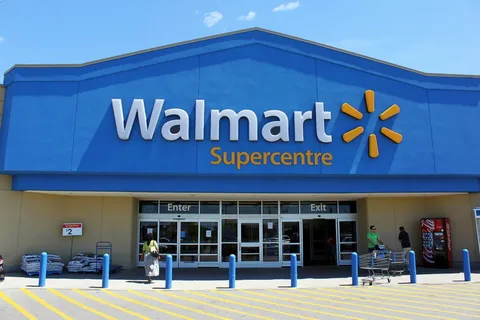Walmart has again been at the eye of a political and economic hurricane. In a plain and fiery post on Truth Social, President Trump openly berated Walmart, insisting that the business must “eat the tariffs” and not pass the cost along to the purchaser. The action has ignited a retail and economic wildfire, with Walmart, the nation’s biggest retailer, threatening price increases because of rising import tariffs—particularly from China. With more than 4,600 locations and tens of millions of daily customers, Walmart now is under extreme pressure to protect Americans from the effects of trade policy they didn’t enact.
Read More: Car Insurance Premiums Surge: UAE Faces Global Shock
Trump’s Message: Absorb Tariffs, Don’t Blame Them
President Trump’s message to Walmart was crude and uncompromising. He stated that Walmart has earned “billions” in profits and needs to cease accusing tariffs of being the cause for future price hikes. On Truth Social, he posted:
“Walmart should STOP trying to use tariffs as the reason to hike prices throughout the chain.’ Between China and Walmart, they should, as is said, ‘EAT THE TARIFFS,’ and not charge valued customers ANYTHING.
Trump’s economic team is under stress to control inflation, a bedrock campaign pledge. Trump is attempting to gain favor with already frustrated American consumers by taking on Walmart. Industry analysts, however, insist that tariffs, regardless of how politically presented, actually do affect prices, and Walmart can only spread its burden so far.
Walmart’s Defense: Retail Margins Are Thin
CEO Doug McMillon and CFO John David Rainey were steadfast in Walmart’s rationale. They acknowledged that the company will attempt to reduce the impact, but elevated tariffs—now 30%—make it practically impossible to keep prices the same in every category.
“Considering the fact of thin retail margins,” McMillon explained, “Walmart cannot absorb these tariffs entirely.”
In reality, Walmart said that product lines such as groceries, electronics, toys, school materials, and even car parts would probably be affected. Those price hikes are set to come by June, with some impacts being noticed as early as May. In spite of all the political firestorm, Walmart affirms that it will keep doing everything in its power to maintain low prices for American families.
Also Read: Market Confusion Alert: Bank of England’s Bold Forecast Gamble
Political and Economic Fallout: 2024 in Focus
Trump’s battle with Walmart is not so much about prices—it’s very political. Inflation, trade, and economic credibility are all at stake. Trump’s call for Walmart and other retailers “to eat the tariffs” as he heads into the 2024 election is a naked, populist move. But many economists say this account is unrealistic.
Information indicates consumer confidence has fallen 2.7% over the last month, and the rumblings of a recession are increasing. Although Walmarts can hold off on some price hikes because it has sufficient clout, even Walmart cannot resist the impact of an international trade war forever. When prices go up, Walmart customers—numerous of whom are working-class voters—will directly feel it, perhaps changing political currents.
What’s Next: Price Increases or Political Pressure
Walmarts hasn’t announced specific price hikes, but its hints are that it won’t be long before its customers start to notice. From staple groceries to school supplies, Walmart’s shelves might appear as usual—but its prices will be higher. Trump’s public pressure campaign is likely to persist, but so will the economic backlash.
For the time being, Walmarts promises to shield shoppers to the extent possible, but even the world’s biggest retailer has only so much influence. Tariffs, trade wars, and politics are a volatile combination—and Walmart is right in the middle.
Even while Trump insists otherwise, Walmarts has an economic reality that even slogans can’t eliminate. What the company does in the weeks ahead could determine not only shopping statements—but national political debate.
For More Trending Business News, Follow Us 10xtimes News






